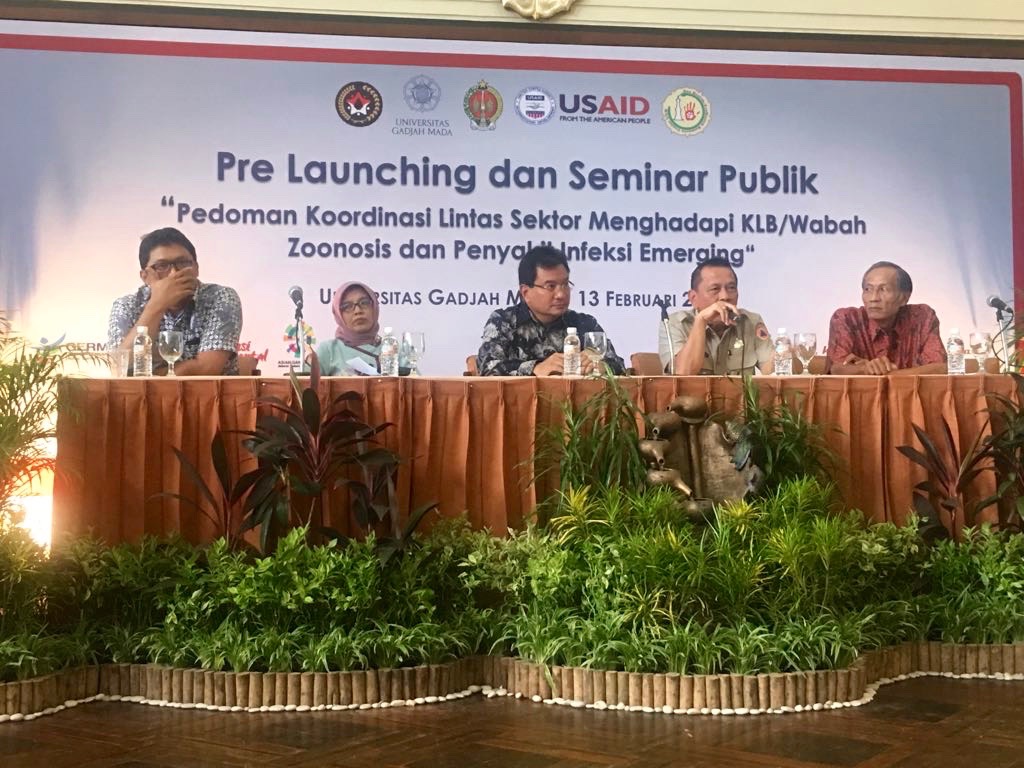Foreseeing Future Threat of Zoonoses and Emerging Infectious Diseases—Ministry of Human Development and Culture (Kemenko PMK) Developed One Health Coordination Guideline.
“The Coordinating Ministry of Human Development and Culture of the Republic of Indonesia (Kemenko PMK) has developed One Health Coordination Guideline to prepare for future storms of emerging infectious diseases and zoonoses with the support of the United States Agency for International Development (USAID).” This statement is delivered by the Deputy for Health Improvement Coordination, Kemenko PMK, Sigit Priohutomo, at the pre-launching and public seminar of the One Health Coordination Guideline in the University of Gadjah Mada, Yogyakarta, on Tuesday, February 13th of 2018.
“Joint effort of the ministries and institutions has led to the creation of this guideline, which in the future be used as a reference for future policies on issues regarding collaboration of health sectors—all of this to create more integrated, effective and efficient approaches between multi-sectoral parties in facing future threats of outbreaks due to zoonoses and emerging infectious diseases.” – Deputy for Health Improvement Coordination, Kemenko PMK, Sigit Priohutomo.
The purpose of this guideline is to build a comprehensive and stronger coordination between ministries and related government institutions, such as the Indonesian National Board for Disaster Management (BNPB), the Ministry of Health, the Ministry of Agriculture, The Ministry of Environment and Forestry, and The Ministry of Home Affairs.
“Observing the experience that took place in the District of Boyolali, where they utilize the practice of One Health approach when dealing with suspected cases of rabies caused by bites from long-tailed monkeys and dogs from the period of January until October 2016.” – Sigit Priohutomo
Through implementing multi-sectoral cooperation and coordination, those cases could be handled faster and in a way that is more systematic. The Kemenko PMK has arranged this guideline since the year of 2016, with the support of the ministries, institutions, local governments, and the Emerging Pandemic Threats-2 (EPT-2) Program of the USAID. EPT-2 is a collaborative program which is supported by international institutions, university and another research center such as the Food and Agriculture Organization of the United Nations (UNFAO), World Health Organization (WHO), PREDICT-2 (chaired by the Eijkman Institute and the Bogor Agricultural University), Preparedness and Response (organized by the Development Alternatives Incorporated), One Health Workforce (chaired by the Indonesia One Health University Network), Indonesian Red Cross Society (PMI) and the International Federation of Red Cross and Red Crescent Societies (IFRC).
“For more than 10 years, together—with the Government of Indonesia, universities, international aid agencies and research centers—USAID have built collaborative effort to increase capacities of the resources in the area of human health, animal health and the environment health against avian influenza and other emerging infectious diseases.” – Ryan Washburn, Mission Director at USAID Indonesia.
Collaboration between the Government and the Universities
The University of Gadjah Mada, as one of the member of INDOHUN, has underlined the importance of academician’s responsibility in One Health—which is to prepare future health workers that are highly capable in working in a multi-sectoral environment, whether it is in the field of human health, animal health, environment health, research as well as in community service programs.
“The University of Gadjah Mada’s One Health Collaborating Center has implemented programs such as conducting multi-drug resistance tuberculosis (MDR-TB) research, zoonotic diseases mapping, community services (through the One Health KKN program), international seminar of One Health concerning zoonoses and wildlife, infectious diseases detection workshops and summer course concerning wildlife.” – the Rector of UGM, Prof, Ir. Panut Mulyono, M.Eng., D.Eng.
In the last 30 years, our world has been faced with many emerging infectious diseases and zoonotic diseases—which commonly occurred in a large geographical coverage, transmitted from a species to another, caused high casualties, experienced shifting in their pathogenesis or even in their pathogen’s own genome. Since the year of 2003, the World Health Organization (WHO) has reported 854 cases of avian influenza (H5N1) in humans—which caused 449 deaths. The Center of Disease Control and Prevention (CDC) estimated that there are 2.5 billion cases of zoonoses and 2.7 million deaths worldwide.
As a closing remark, Indonesia has a high incidence in emerging infectious disease. Moreover, Indonesia is one of the world’s richest country in terms of its biodiversity—making it more vulnerable to zoonotic threats. Thus, creating a comprehensive approach by creating a systematic multi-sectoral collaboration is important to face future threats of emerging zoonotic diseases and zoonoses.
This Press Release is a translation of the:
PERS RILIS BERSAMA
Kemenko Pembangunan Manusia dan Kebudayaan
Universitas Gadjah Mada
USAID Indonesia
Alessa Fahira
Indonesia One Health University Network
Communication and Networking Team
